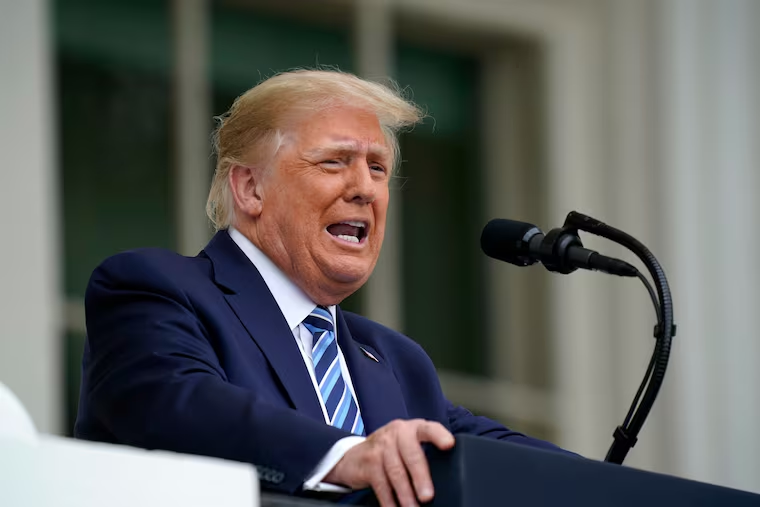Trump and 17 states join Texas effort to convince Supreme Court to void the vote in Pennsylvania
With their filings, Trump and more than a third of states in the union have now endorsed an unprecedented effort to disenfranchise voters in four states because of their support for Biden.

President Donald Trump and 17 Republican-leaning states threw their support Wednesday behind Texas’ long-shot bid to persuade the U.S. Supreme Court to nullify the decisions of millions of voters in Pennsylvania and three other battleground states.
In separate briefs, Trump and the states, led by Attorney General Eric S. Schmitt of Missouri, suggested that results from Pennsylvania, Georgia, Wisconsin, and Michigan cannot be trusted and accused judges and elected officials there of capitalizing on the coronavirus pandemic to introduce what they described as “drastic and fraud-inducing” changes to election law.
With their filings, Trump and GOP officials in more than a third of states in the union have now endorsed an unprecedented and audacious effort to disenfranchise voters in states that supported his opponent.
“These things don’t normally happen,” the president’s attorney wrote in his filing, which cited as evidence an opinion poll that concluded 75% of Republicans believe the election was stolen. “A large percentage of the American people know that something is deeply amiss.”
Supreme Court watchers and election-law experts on both sides of the partisan divide have widely panned the case, which was filed Tuesday by Texas Attorney General Ken Paxton, and say there is little chance the Supreme Court justices will agree to its proposed remedy: throwing out the results in four battlegrounds and appointing their state lawmakers to decide the winner instead.
Still, Trump and his allies, have rallied around it as a last stand in their legal campaign to reverse President-elect Joe Biden’s victory after a consistent string of courtroom losses including a Supreme Court decision a day earlier not to consider another challenge to Pennsylvania’s results brought by U.S. Rep. Mike Kelly (R., Pa.).
» READ MORE: U.S. Supreme Court rejects GOP congressman’s last-minute effort to upend Pennsylvania’s election results
Trump sought to distance himself from Kelly’s case Wednesday, declaring on Twitter that he had nothing to do with it. Of the Texas suit, he added, this is “the case everyone has been waiting for.”
Paxton’s brief — which was riddled with factual inaccuracies, debunked conspiracy theories, and witness testimony that has previously been rejected by lower courts — argues that judges and elected officials in each of the battleground states usurped the will of their legislatures by implementing policies and court decisions that made it easier for people to vote amid the pandemic.
Courts in each of the four states have consistently rebuffed such claims.
Still, 17 states signed on to an amicus brief in support of Paxton’s case Wednesday: Alabama, Arkansas, Florida, Indiana, Kansas, Louisiana, Mississippi, Missouri, Montana, Nebraska, North Dakota, Oklahoma, South Carolina, South Dakota, Tennessee, Utah, and West Virginia.
Their filing sought to cast doubt on the integrity and security of mail voting and the counting of votes after Election Day — despite the fact that many of the signatories offered the same voting methods they are now challenging to their own citizens.
For instance, both Kansas and Mississippi count late-arriving mail ballots, and Utah and Florida, like Pennsylvania, permitted no-excuse mail voting this year.
Trump’s brief — written by Chapman University law professor John Eastman, who has recently argued that Kamala Harris, as a daughter of immigrants, was ineligible to become the vice president — complained that a Biden victory was improbable given that Trump had carried both Florida and Ohio, a feat he inaccurately claimed no other candidate had ever done and lost.
Richard Nixon won both states in 1960 and was still defeated by John F. Kennedy.
For the U.S. Supreme Court to consider the case, a group of Republican lawyers and former elected officials including ex-New Jersey Gov. Christine Todd Whitman said in their own filing Wednesday, “would violate the most fundamental principles” of the Constitution.
» READ MORE: Republican Sen. Pat Toomey calls Trump’s campaign to overturn Pennsylvania election ‘completely unacceptable’
The justices have given Pennsylvania and the three other defendant states until Thursday to respond and have not indicated how quickly they might issue a ruling.
Meanwhile, the string of losses for Trump and his allies continued Wednesday with a decision from a Pennsylvania appellate court to dismiss a separate challenge filed by nine GOP state lawmakers, led by Rep. Daryl Metcalfe (R., Butler).
Metcalfe had asked the Commonwealth Court to roll back the certification of Pennsylvania’s election, which Biden won by some 81,000 votes, based on speculative theories of wrongdoing, warmed-over conspiracies, and previously rejected arguments.
The court’s president judge — Mary Hannah Leavitt, a Republican — dismissed the case, saying Metcalfe and his fellow plaintiffs had waited too long to file their challenge and noting they were unlikely to prevail on the merits of their case.